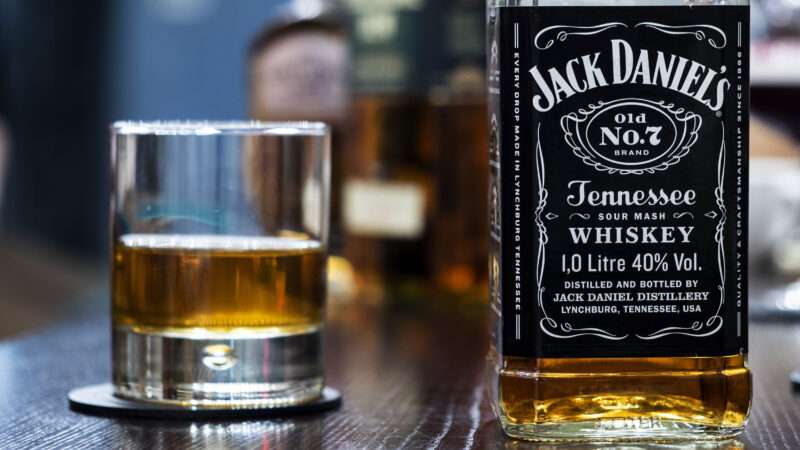
In a case involving poop jokes on dog chew toys shaped like liquor bottles—yes, really—the U.S. Supreme Court ruled Thursday that the First Amendment does not broadly protect parody products from violating U.S. copyright laws.
In a unanimous ruling for Tennessee-based Jack Daniel's, the justices determined that lower courts had erred by rejecting the whiskey maker's claim that a brand of parody chew toys violated the brand's copyright protections. Those chew toys, manufactured by VIP Products, roughly copied the iconic shape of a Jack Daniel's bottle and parodied the brand's label—replacing the famous "Old No. 7 Tennessee Whiskey" signage with a joke about "The Old No. 2 on your Tennessee Carpet."
In its petition, Jack Daniel's claimed the VIP Products' "Bad Spaniels" chew toy both infringed and diluted the Jack Daniel's brand. Both would be violations of the Lanham Act, the federal law governing copyrights. A federal district court sided with the whiskey brand. However, the 9th Circuit Court of Appeals reversed that ruling by pointing to the fact that courts have long recognized a First Amendment right to parody commercial products in artistic expression—the so-called "Rogers test," which is derived from a 1989 Supreme Court case involving performer Ginger Rogers.
In Thursday's ruling, Justice Elena Kagan said those precedents do not apply to the "Bad Spaniels" chew toy case.
The Rogers test applies to artistic works that "have an 'expressive element' implicating 'First Amendment values' and carry only a 'slight risk' of confusing consumers about the 'source or content' of the underlying work," Kagan wrote. Trademarks are allowed to be used for "expressive functions" but not as a stand-in for a trademark itself, she added. That's why the name "Barbie" can be used in song lyrics—something that courts actually had to decide in the wake of the 1997 Europop hit song "Barbie Girl."
"Consumer confusion about source—trademark law's cardinal sin—is most likely to arise when someone uses another's trademark as a trademark," Kagan concluded. "In such cases, Rogers has no proper application."
This is, ultimately, a narrow ruling that Kagan explicitly says should not be construed as a review of the merits of the Rogers test. Even in that narrow sense, however, it should raise an eyebrow. The idea that consumers would be meaningfully misled by this parody product—one that is fairly obviously a dog toy and not a bottle of liquor—stains credulity even if fits within the confines of copyright law. So does the determination that VIP Products wasn't engaging in artistic expression. Even bad jokes are deserving of First Amendment protection.
The case will be re-heard by the 9th Circuit—but this time without VIP Products being able to lean on the Rogers test as a defense.
In all, Thursday's ruling is not a major blow to free expression or the right to sell parody products. But it is certainly a victory for brands that can't take a joke.
The post Supreme Court Sides With Jack Daniel's Against Doggy Chew Toy Company appeared first on Reason.com.







